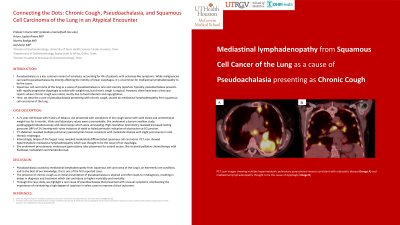Monday Poster Session
Category: Esophagus
P1933 - Connecting the Dots: Chronic Cough, Pseudoachalasia, and Squamous Cell Carcinoma of the Lung in an Atypical Encounter
Monday, October 23, 2023
10:30 AM - 4:15 PM PT
Location: Exhibit Hall

Has Audio

Prateek S. Harne, MBBS, MD
University of Texas
Houston, TX
Presenting Author(s)
Prateek S. Harne, MBBS, MD1, Arturo Suplee Rivera, MD2, Murthy Badiga, MD, FACG3, Asif Zamir, MD, FACG3
1University of Texas, Houston, TX; 2University of Texas, Edinburg, TX; 3DHR Health Gastroenterology, Edinburg, TX
Introduction: Pseudoachalasia is a less common variant of achalasia, accounting for 4% of patients with achalasia-like symptoms.1 While malignancies can lead to pseudoachalasia by directly affecting the motility of lower esophagus, it is uncommon for mediastinal lymphadenopathy to be the cause. Squamous cell carcinoma of the lung as a cause of pseudoachalasia is rare and scarcely reported. Typically, pseudoachalasia presents with rapidly progressive dysphagia to solids with weight loss, but chronic cough is atypical. However, there have been a few case reports where chronic cough was noted, mostly due to food retention and regurgitation.2 Here, we describe a case of pseudoachalasia presenting with chronic cough, caused by mediastinal lymphadenopathy from squamous cell carcinoma of the lung.
Case Description/Methods: A 71-year-old female with history of tobacco use presented with complaints of dry cough worse with solid meals and unintentional weight loss for 6 months. Vitals and laboratory values were unremarkable. She underwent a barium swallow study, esophagogastroduodenoscopy and colonoscopy which were unrevealing. High-resolution manometry revealed increased resting pressures (IRP) of 24.3mmHg with some instances of weak or failed peristalsis indicative of obstruction at EG junction. CT abdomen revealed multiple pulmonary parenchymal masses consistent with metastatic disease with slight prominence in mid-thoracic esophagus. Interestingly, biopsy of the largest mass revealed moderately differentiated squamous cell carcinoma. PET scan showed hypermetabolic mediastinal lymphadenopathy which was thought to be the cause of her dysphagia. She underwent percutaneous endoscopic gastrostomy tube placement for enteral access. She received palliative chemotherapy with Paclitaxel, Carboplatin and Pembrolizumab.
Discussion: Pseudoachalasia caused by mediastinal lymphadenopathy from squamous cell carcinoma of the lung is an extremely rare condition, and to the best of our knowledge, this is one of the first reported cases. The presence of chronic cough as an initial presentation of pseudoachalasia is atypical and often leads to misdiagnosis, resulting in delays in diagnosis and treatment which can contribute to higher morbidity and mortality. Through this case study, we highlight a rare cause of pseudoachalasia that presented with unusual symptoms, emphasizing the importance of maintaining a high degree of suspicion in select cases to improve clinical outcomes.

Disclosures:
Prateek S. Harne, MBBS, MD1, Arturo Suplee Rivera, MD2, Murthy Badiga, MD, FACG3, Asif Zamir, MD, FACG3. P1933 - Connecting the Dots: Chronic Cough, Pseudoachalasia, and Squamous Cell Carcinoma of the Lung in an Atypical Encounter, ACG 2023 Annual Scientific Meeting Abstracts. Vancouver, BC, Canada: American College of Gastroenterology.
1University of Texas, Houston, TX; 2University of Texas, Edinburg, TX; 3DHR Health Gastroenterology, Edinburg, TX
Introduction: Pseudoachalasia is a less common variant of achalasia, accounting for 4% of patients with achalasia-like symptoms.1 While malignancies can lead to pseudoachalasia by directly affecting the motility of lower esophagus, it is uncommon for mediastinal lymphadenopathy to be the cause. Squamous cell carcinoma of the lung as a cause of pseudoachalasia is rare and scarcely reported. Typically, pseudoachalasia presents with rapidly progressive dysphagia to solids with weight loss, but chronic cough is atypical. However, there have been a few case reports where chronic cough was noted, mostly due to food retention and regurgitation.2 Here, we describe a case of pseudoachalasia presenting with chronic cough, caused by mediastinal lymphadenopathy from squamous cell carcinoma of the lung.
Case Description/Methods: A 71-year-old female with history of tobacco use presented with complaints of dry cough worse with solid meals and unintentional weight loss for 6 months. Vitals and laboratory values were unremarkable. She underwent a barium swallow study, esophagogastroduodenoscopy and colonoscopy which were unrevealing. High-resolution manometry revealed increased resting pressures (IRP) of 24.3mmHg with some instances of weak or failed peristalsis indicative of obstruction at EG junction. CT abdomen revealed multiple pulmonary parenchymal masses consistent with metastatic disease with slight prominence in mid-thoracic esophagus. Interestingly, biopsy of the largest mass revealed moderately differentiated squamous cell carcinoma. PET scan showed hypermetabolic mediastinal lymphadenopathy which was thought to be the cause of her dysphagia. She underwent percutaneous endoscopic gastrostomy tube placement for enteral access. She received palliative chemotherapy with Paclitaxel, Carboplatin and Pembrolizumab.
Discussion: Pseudoachalasia caused by mediastinal lymphadenopathy from squamous cell carcinoma of the lung is an extremely rare condition, and to the best of our knowledge, this is one of the first reported cases. The presence of chronic cough as an initial presentation of pseudoachalasia is atypical and often leads to misdiagnosis, resulting in delays in diagnosis and treatment which can contribute to higher morbidity and mortality. Through this case study, we highlight a rare cause of pseudoachalasia that presented with unusual symptoms, emphasizing the importance of maintaining a high degree of suspicion in select cases to improve clinical outcomes.

Figure: PET scan images showing multiple hypermetabolic pulmonary parenchymal masses consistent with metastatic disease (Image A) and mediastinal lymphadenopathy thought to be the cause of dysphagia (Image B)
Disclosures:
Prateek Harne indicated no relevant financial relationships.
Arturo Suplee Rivera indicated no relevant financial relationships.
Murthy Badiga indicated no relevant financial relationships.
Asif Zamir indicated no relevant financial relationships.
Prateek S. Harne, MBBS, MD1, Arturo Suplee Rivera, MD2, Murthy Badiga, MD, FACG3, Asif Zamir, MD, FACG3. P1933 - Connecting the Dots: Chronic Cough, Pseudoachalasia, and Squamous Cell Carcinoma of the Lung in an Atypical Encounter, ACG 2023 Annual Scientific Meeting Abstracts. Vancouver, BC, Canada: American College of Gastroenterology.

